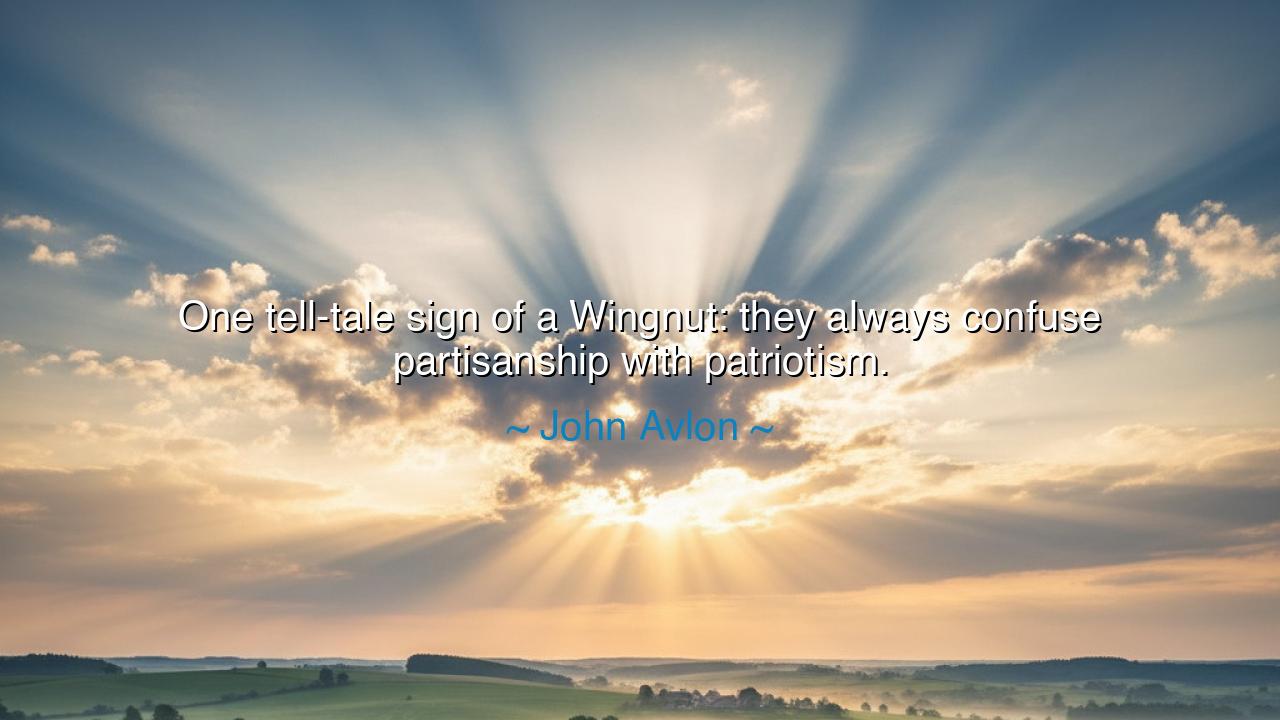
One tell-tale sign of a Wingnut: they always confuse






John Avlon, a voice of sharp reason in our age of clamor, once gave a warning that pierces like a blade of truth: “One tell-tale sign of a Wingnut: they always confuse partisanship with patriotism.” In these words, he reveals a danger as old as politics itself—that narrow loyalty to a party or faction may masquerade as love of country. He speaks of the Wingnut, the zealot whose allegiance is not to the nation as a whole, but to his own tribe, his own side, his own banner. And yet he cloaks this factional fire in the noble robe of patriotism, pretending that the victory of his party is the same as the survival of the nation.
The meaning is as clear as it is perilous. Partisanship is the love of party—it binds a man to a cause or a faction, often blinding him to the larger good. Patriotism, by contrast, is love of country—it calls a man to sacrifice his own side’s interest when the greater whole requires it. When the two are confused, chaos is born. For then, what benefits one party is hailed as patriotic, and what harms the other is deemed betrayal, even if both be false. The nation itself is forgotten, while the battle of factions consumes all.
History has shown us the ruin of this confusion. Recall the late years of the Roman Republic, when senators ceased to see themselves as Romans first, but as loyalists to Caesar, or to Pompey, or to their own faction. Each claimed to be the true defender of Rome, each draped themselves in the mantle of patriotism, yet their loyalty was to partisanship alone. The Republic, torn apart by this false patriotism, collapsed into dictatorship and civil war. So it has been in many lands: when men mistake their party’s triumph for their country’s health, the nation itself is imperiled.
Yet Avlon’s words are not only a warning for statesmen; they are a mirror for every citizen. For in our own hearts, how easily do we slip into this same delusion? How often do we see our opponents not as fellow countrymen, but as enemies? How often do we equate the defeat of our rivals with the salvation of our land? The Wingnut dwells not only in the public square but in the private heart, where pride whispers: “My side is the nation, and whoever opposes me is a traitor.” Thus the delusion spreads, and the bonds of unity weaken.
But there is a higher way. True patriotism demands humility. It asks us to see beyond the banners of party, to love even those with whom we disagree, for they too are the children of the land we cherish. It calls us to place country above party, truth above slogans, and the common good above factional gain. It is harder, yes, than cheering for one’s side—but it is nobler, stronger, and more enduring.
From this truth, we learn a lesson for our lives. Be wary of leaders who stir hatred of fellow citizens in the name of patriotism. Be wary of your own heart when it delights more in the defeat of your rivals than in the flourishing of your nation. Seek instead to bridge divides, to listen with patience, to honor the humanity of those on the other side. For in this lies the strength of a people: not in the shouting of factions, but in the quiet labor of unity.
Therefore, take this wisdom as a guide: never mistake partisanship for patriotism. Stand firm in your convictions, but hold them with humility. Love your country enough to love even those who oppose you. And when others confuse the triumph of their party with the good of the nation, let your life prove otherwise. For the truest patriot is not he who wins for his side, but he who strengthens the whole.
So let Avlon’s words be to you as a lamp in times of division. The Wingnut confuses loyalty to party with love of nation; the wise citizen knows the difference. Choose, then, the higher way, and you will help ensure that your country does not fall to the fate of Rome, but rises instead to a destiny worthy of its people.






AAdministratorAdministrator
Welcome, honored guests. Please leave a comment, we will respond soon